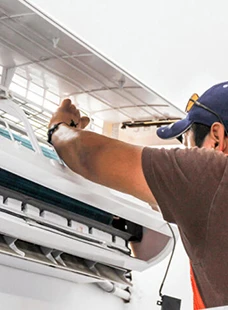

A year ago Wallace suffered a ruptured liver abscess. It took three months to recover. He lost 100 pounds.
Wallace is a survivor and wants to get his life back together, returning to work as a certified air-conditioning technician. But he needs medical care and has no health insurance.
If he lived in a state that expanded Medicaid, Wallace would have access to affordable health care. Unfortunately, Florida is one of 12 states without expanded Medicaid, leaving working poor residents like Wallace with no affordable path to health care. In Florida, Medicaid is strictly limited, covering only low-income children and parents, pregnant women and individuals with disabilities.
Wallace feels “85% healthy” physically but says he’s a little shakier emotionally after his ordeal.
“I have wild mood swings and I don’t know why,” Wallace said. ““When I’m happy I feel I can do anything,” Wallace says. “When I get down, I feel run over and don’t want to talk to anybody.” He diagnosed himself as Bipolar.
If he could get evaluated to find out what he really suffers from and get on medications that stabilize him or go into counseling, he says he would feel more confident going back into the workforce. He also wants to keep his weight down and avoid excessive drinking, which he thinks led to his liver disease.
“I’d like to get help but I don’t know how to do that,” he says. “I can’t afford it either. I know if I don’t take care of this I won’t be able to go back to work or last long. I’m stuck right now.”
“Having health insurance would lift a lot of stress and depression.”
More than half a million adults in Florida experience serious mental illness.
A recent report showed nearly one-fifth of Floridians (17.5 percent) aged 18 and older have a mental illness, and over 7 percent of Florida’s adults have a substance use disorder.
In Florida, mental health and substance abuse counseling services are expensive and limited, even for those with health insurance. Almost 60 percent of adults with mental illness in Florida do not receive treatment.
https://floridahealthjustice.org/mental-illness-and-criminal-justice-in-florida.html
If Florida expanded Medicaid, the federal government would pay for 90 percent of healthcare costs, including mental health services, greatly expanding community mental health centers that could help residents like Wallace get the help they needed.
https://floridahealthjustice.org/connecting-the-dots.html
A year ago Wallace suffered a ruptured liver abscess. It took three months to recover. He lost 100 pounds.
Wallace is a survivor and wants to get his life back together, returning to work as a certified air-conditioning technician. But he needs medical care and has no health insurance.
If he lived in a state that expanded Medicaid, Wallace would have access to affordable health care. Unfortunately, Florida is one of 12 states without expanded Medicaid, leaving working poor residents like Wallace with no affordable path to health care. In Florida, Medicaid is strictly limited, covering only low-income children and parents, pregnant women and individuals with disabilities.
Wallace feels “85% healthy” physically but says he’s a little shakier emotionally after his ordeal.
“I have wild mood swings and I don’t know why,” Wallace said. ““When I’m happy I feel I can do anything,” Wallace says. “When I get down, I feel run over and don’t want to talk to anybody.” He diagnosed himself as Bipolar.
If he could get evaluated to find out what he really suffers from and get on medications that stabilize him or go into counseling, he says he would feel more confident going back into the workforce. He also wants to keep his weight down and avoid excessive drinking, which he thinks led to his liver disease.
“I’d like to get help but I don’t know how to do that,” he says. “I can’t afford it either. I know if I don’t take care of this I won’t be able to go back to work or last long. I’m stuck right now.”
“Having health insurance would lift a lot of stress and depression.”
More than half a million adults in Florida experience serious mental illness.
A recent report showed nearly one-fifth of Floridians (17.5 percent) aged 18 and older have a mental illness, and over 7 percent of Florida’s adults have a substance use disorder.
In Florida, mental health and substance abuse counseling services are expensive and limited, even for those with health insurance. Almost 60 percent of adults with mental illness in Florida do not receive treatment.
https://floridahealthjustice.org/mental-illness-and-criminal-justice-in-florida.html
If Florida expanded Medicaid, the federal government would pay for 90 percent of healthcare costs, including mental health services, greatly expanding community mental health centers that could help residents like Wallace get the help they needed.
https://floridahealthjustice.org/connecting-the-dots.html

